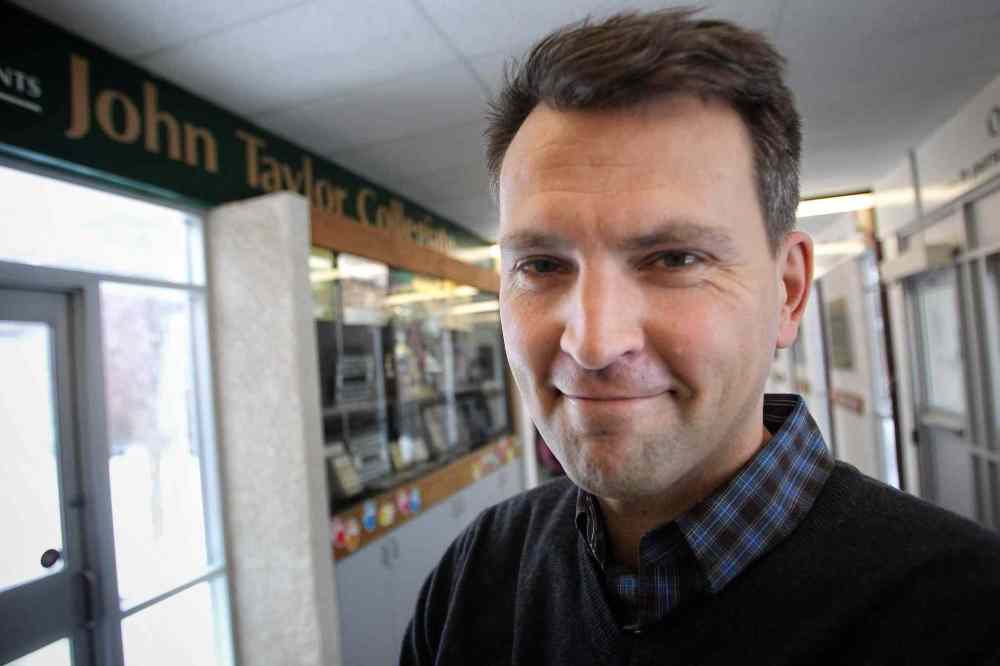From hell to home: John Taylor graduate tells of destroying weapons
Advertisement
Read this article for free:
or
Already have an account? Log in here »
To continue reading, please subscribe:
Monthly Digital Subscription
$0 for the first 4 weeks*
- Enjoy unlimited reading on winnipegfreepress.com
- Read the E-Edition, our digital replica newspaper
- Access News Break, our award-winning app
- Play interactive puzzles
*No charge for 4 weeks then price increases to the regular rate of $19.00 plus GST every four weeks. Offer available to new and qualified returning subscribers only. Cancel any time.
Monthly Digital Subscription
$4.75/week*
- Enjoy unlimited reading on winnipegfreepress.com
- Read the E-Edition, our digital replica newspaper
- Access News Break, our award-winning app
- Play interactive puzzles
*Billed as $19 plus GST every four weeks. Cancel any time.
To continue reading, please subscribe:
Add Free Press access to your Brandon Sun subscription for only an additional
$1 for the first 4 weeks*
*Your next subscription payment will increase by $1.00 and you will be charged $16.99 plus GST for four weeks. After four weeks, your payment will increase to $23.99 plus GST every four weeks.
Read unlimited articles for free today:
or
Already have an account? Log in here »
Hey there, time traveller!
This article was published 28/11/2013 (4359 days ago), so information in it may no longer be current.
It was surreal: this laid back, deadpan-humour world saver standing in one of the safest places on Earth Wednesday and telling spellbound kids how he destroys some of the most horrendous weapons ever to crawl out of hell.
Scott Cairns was at John Taylor Collegiate Wednesday, where he graduated in 1989, never dreaming that in 2013 he’d be part of a team going to Oslo next week to accept the Nobel Peace Prize.
Cairns kept one of the bullets that were fired into his United Nations vehicle the first time his team of chemical weapons inspectors tried to drive into a Damascus suburb where they believed the government had attacked its own people with nerve gas.

“Cool souvenir, I guess — it’s more of a reminder that it gets very real, very quickly,” Cairns told the students during a brief respite to see his parents in Winnipeg.
Cairns saw the guy who fired the shots, maybe 20 metres away — first the tires, then the chassis, then the reinforced windshield.
“It really pissed me off,” said Cairns.
“I wanted so much to get out of the vehicle and go over and wrap his AK-47 around his neck.”
Fortunately, the UN convoy turned around, but soon returned, driving through the buffer zone “superfast” while holding their body armour up to the windows.
One of the crew fears his wife will kill him if she finds out they did that, Cairns said.
Once in the rebel-held neighbourhood, the UN crews interviewed witnesses, examined victims and gathered forensic evidence.
“It was hotter than hell, 35 to 40 degrees,” stifling while wearing breathing gear and body armour covering special charcoal-based covering meant to absorb sarin and other nerve gases before they could reach his skin.
Cairns showed a photo of a distraught young boy from whom he was about to take blood — a boy who’d just lost a dozen family members who, before succumbing, had covered him with blankets and thrown their own bodies over top of him.
‘Any door is open to you, as long as you’re willing to open that door yourself and take that step’
— Nobel Peace Prize winner Scott Cairns, speaking to John Taylor Collegiate students Wednesday
The UN investigators were always surrounded by Syrian rebels; every man, woman and child using devices to photograph their every move and, in at least one case, live-stream their inspection.
Expecting aerial attacks by the west at any moment, the UN inspectors instead had a new role when Syria suddenly agreed to surrender its chemical weapons.
Back they came to destroy those weapons. “Once Syria blinked and signed the convention, we went into the country and dismantled their weapons,” said Cairns.
“High explosives are my favourite way to destroy things,” he said. “Whenever I could, I tried to crush things with tanks — it’s cooler.”
Bleach can neutralize the chemicals by changing them into something less dangerous, said Cairns, a University of Manitoba chemistry major back in the day. Of course, that first requires exposing the chemical.
He recalled when he was on a team that went into Cambodia, Laos and Vietnam to find and dismantle weapons left over from the war 40 years before.
Within an hour, as carefully as they were working, they inadvertently exploded an old tear gas canister.
Most of the thousands of Syrian chemical weapons needed the chemicals drained and the explosive charge removed, Cairns said. Not surprisingly, no country has stepped forward to say it would accept the chemicals to get them out of Syria.
Cairns has worked pretty much everywhere in the world people try to find nasty ways to kill each other.

“I would like to go to North Korea, but they haven’t signed the convention” banning chemical weapons, Cairns said.
A nomadic military child whose parents retired to Winnipeg after two postings here, Cairns said he now lives, as far as he spends any downtime anywhere, in The Hague.
“Avoid the comfortable,” he told the John Taylor students.
“Any door is open to you, as long as you’re willing to open that door yourself and take that step.”
nick.martin@freepress.mb.ca

Nick Martin
Former Free Press reporter Nick Martin, who wrote the monthly suspense column in the books section and was prolific in his standalone reviews of mystery/thriller novels, died Oct. 15 at age 77 while on holiday in Edinburgh, Scotland.
Our newsroom depends on a growing audience of readers to power our journalism. If you are not a paid reader, please consider becoming a subscriber.
Our newsroom depends on its audience of readers to power our journalism. Thank you for your support.


